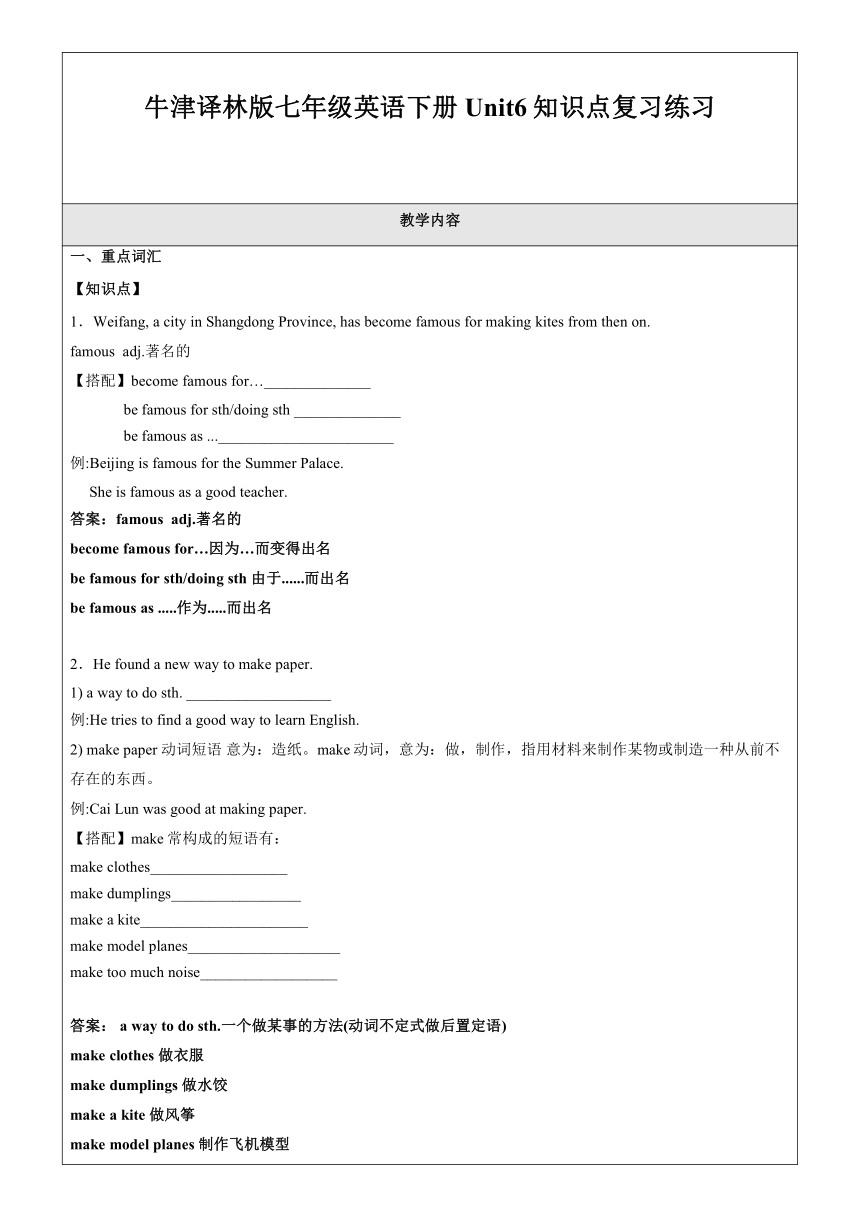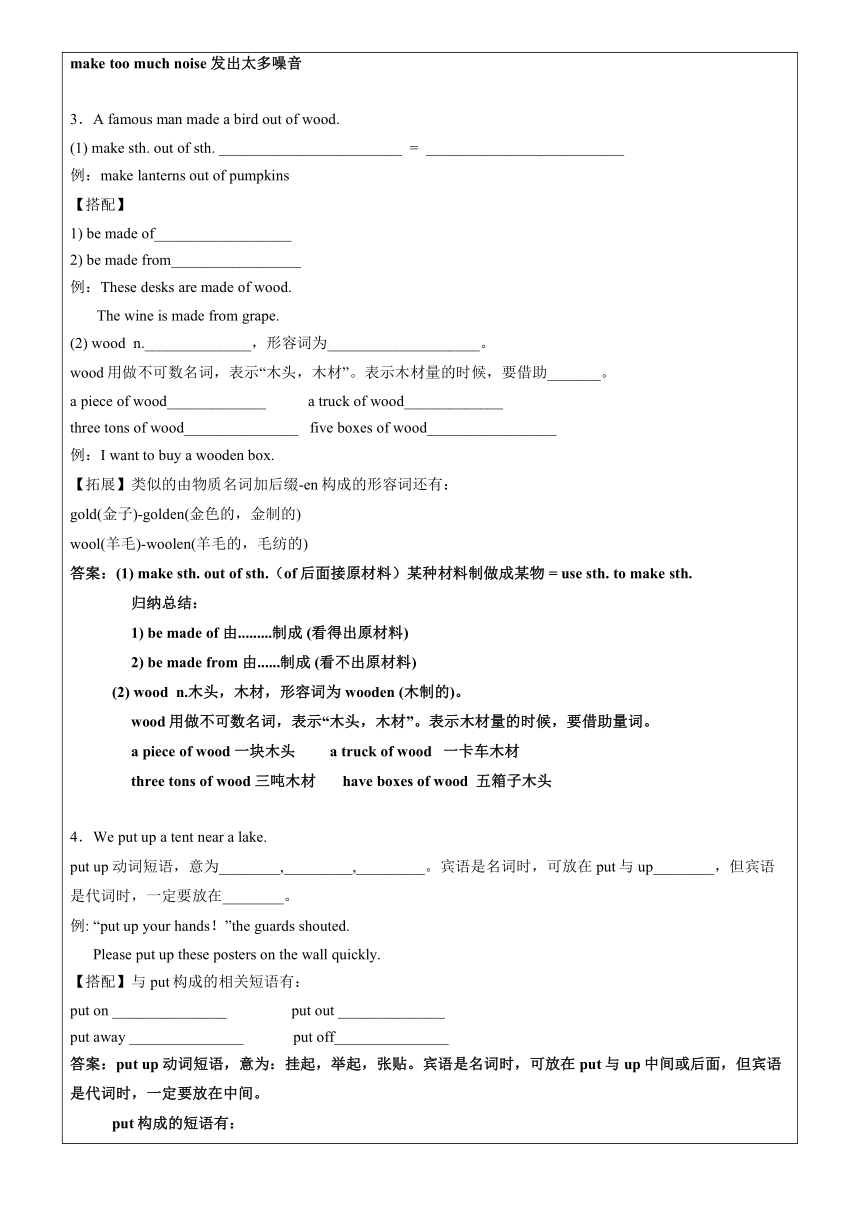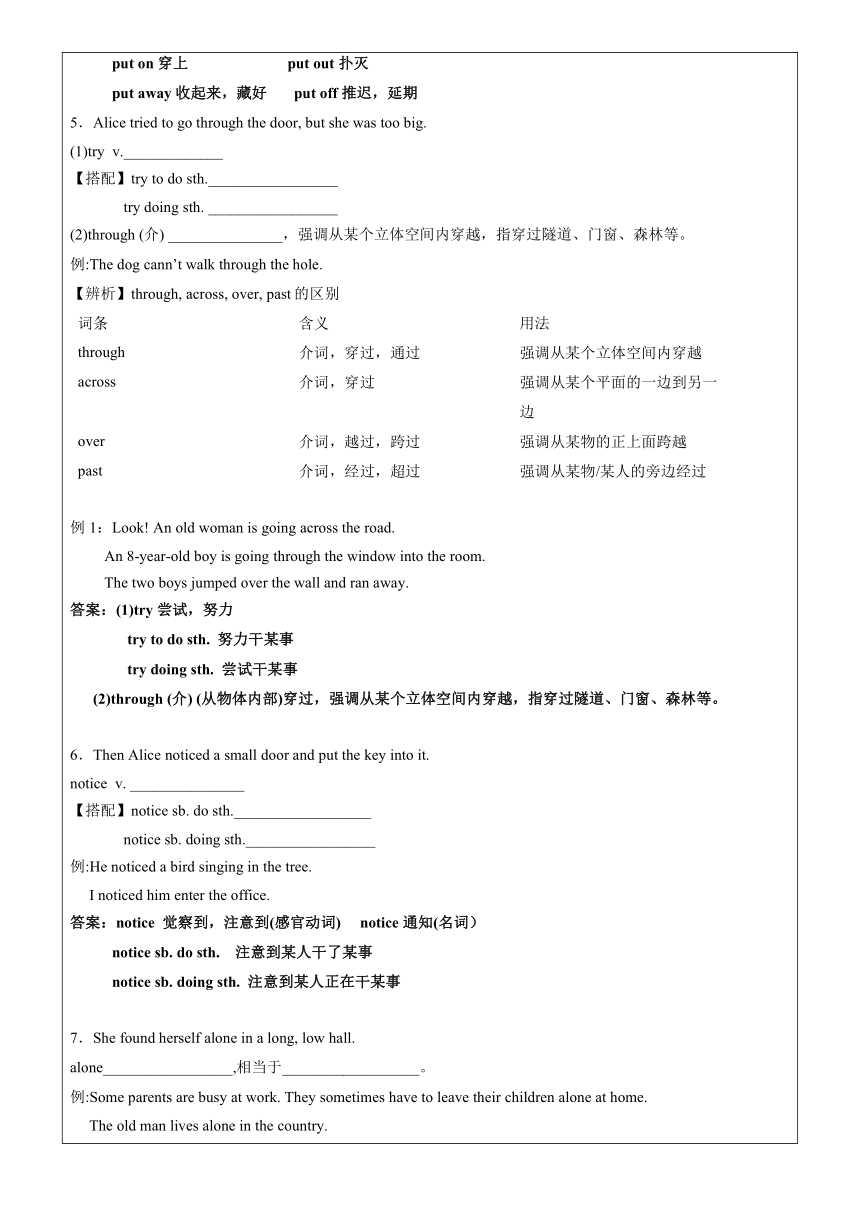牛津译林版英语七年级下Unit 6 Outdoor fun知识点复习及练习(含答案)
文档属性
| 名称 | 牛津译林版英语七年级下Unit 6 Outdoor fun知识点复习及练习(含答案) |  | |
| 格式 | docx | ||
| 文件大小 | 32.4KB | ||
| 资源类型 | 教案 | ||
| 版本资源 | 牛津译林版 | ||
| 科目 | 英语 | ||
| 更新时间 | 2021-05-27 21:56:37 | ||
图片预览



文档简介
牛津译林版七年级英语下册Unit6知识点复习练习
教学内容
一、重点词汇
【知识点】
1.Weifang, a city in Shangdong Province, has become famous for making kites from then on.
famous adj.著名的
【搭配】become famous for…______________
be famous for sth/doing sth ______________
be famous as ..._______________________
例:Beijing is famous for the Summer Palace.
She is famous as a good teacher.
答案:famous adj.著名的
become famous for…因为…而变得出名
be famous for sth/doing sth 由于......而出名
be famous as .....作为.....而出名
2.He found a new way to make paper.
1) a way to do sth. ___________________
例:He tries to find a good way to learn English.
2) make paper 动词短语 意为:造纸。make动词,意为:做,制作,指用材料来制作某物或制造一种从前不存在的东西。
例:Cai Lun was good at making paper.
【搭配】make常构成的短语有:
make clothes__________________
make dumplings_________________
make a kite______________________
make model planes____________________
make too much noise__________________
答案: a way to do sth.一个做某事的方法(动词不定式做后置定语)
make clothes 做衣服
make dumplings 做水饺
make a kite 做风筝
make model planes 制作飞机模型
make too much noise 发出太多噪音
3.A famous man made a bird out of wood.
(1) make sth. out of sth. ________________________ = __________________________
例:make lanterns out of pumpkins
【搭配】
1) be made of__________________
2) be made from_________________
例:These desks are made of wood.
The wine is made from grape.
(2) wood n.______________,形容词为____________________。
wood用做不可数名词,表示“木头,木材”。表示木材量的时候,要借助_______。
a piece of wood_____________ a truck of wood_____________
three tons of wood_______________ five boxes of wood_________________
例:I want to buy a wooden box.
【拓展】类似的由物质名词加后缀-en构成的形容词还有:
gold(金子)-golden(金色的,金制的)
wool(羊毛)-woolen(羊毛的,毛纺的)
答案:(1) make sth. out of sth.(of后面接原材料)某种材料制做成某物 = use sth. to make sth.
归纳总结:
1) be made of 由.........制成 (看得出原材料)
2) be made from 由......制成 (看不出原材料)
(2) wood n.木头,木材,形容词为wooden (木制的)。
wood用做不可数名词,表示“木头,木材”。表示木材量的时候,要借助量词。
a piece of wood 一块木头 a truck of wood 一卡车木材
three tons of wood 三吨木材 have boxes of wood 五箱子木头
4.We put up a tent near a lake.
put up 动词短语,意为________,_________,_________。宾语是名词时,可放在put与up________,但宾语是代词时,一定要放在________。
例: “put up your hands!”the guards shouted.
Please put up these posters on the wall quickly.
【搭配】与put构成的相关短语有:
put on _______________ put out ______________
put away _______________ put off_______________
答案:put up 动词短语,意为:挂起,举起,张贴。宾语是名词时,可放在put与up中间或后面,但宾语是代词时,一定要放在中间。
put构成的短语有:
put on 穿上 put out 扑灭
put away 收起来,藏好 put off 推迟,延期
5.Alice tried to go through the door, but she was too big.
(1)try v._____________
【搭配】try to do sth._________________
try doing sth. _________________
(2)through (介) _______________,强调从某个立体空间内穿越,指穿过隧道、门窗、森林等。
例:The dog cann’t walk through the hole.
【辨析】through, across, over, past的区别
词条
含义
用法
through
介词,穿过,通过
强调从某个立体空间内穿越
across
介词,穿过
强调从某个平面的一边到另一边
over
介词,越过,跨过
强调从某物的正上面跨越
past
介词,经过,超过
强调从某物/某人的旁边经过
例1:Look! An old woman is going across the road.
An 8-year-old boy is going through the window into the room.
The two boys jumped over the wall and ran away.
答案:(1)try 尝试,努力
try to do sth. 努力干某事
try doing sth. 尝试干某事
(2)through (介) (从物体内部)穿过,强调从某个立体空间内穿越,指穿过隧道、门窗、森林等。
6.Then Alice noticed a small door and put the key into it.
notice v. _______________
【搭配】notice sb. do sth.__________________
notice sb. doing sth._________________
例:He noticed a bird singing in the tree.
I noticed him enter the office.
答案:notice 觉察到,注意到(感官动词) notice 通知(名词)
notice sb. do sth. 注意到某人干了某事
notice sb. doing sth. 注意到某人正在干某事
7.She found herself alone in a long, low hall.
alone_________________,相当于__________________。
例:Some parents are busy at work. They sometimes have to leave their children alone at home.
The old man lives alone in the country.
【搭配】found herself alone为固定结构:find+宾语+形容词,表示发觉某人/某物处于某种(意外的)状态;find意为认为,觉得。
例:I find English very important.
【拓展】
(1)find+宾语+介词短语结构表示发觉某人/某物在哪里
例:He woke up and found himself in a hospital bed.他醒来发觉自己躺在医院的床上。
(2)类似的结构有:make/keep/think....+宾语+形容词
例:We must keep our classroom clean.我们必须保持我们的教室清洁。
His words made us happy.他的话让我们很高兴。
答案:(1)alone独自的,单独的(形容词) ,相当于by oneself或on one’s own.
(2)found herself alone为固定结构:find+宾语+形容词,表示发觉某人/某物处于某种(意外的)状态;find意为;认为,觉得。
例:I find English very important.我发现英语很重要。
8.Alice fell for a long time, and then she hit the ground.
fell是fall的过去式,意为____________________
【搭配】和fall有关的短语有:
fall down _______________ fall off _______________
fall behind ______________ fall over_______________
例: Babies often fall when they are learning to walk.
Please climb down the tree, or you will fall down.
答案:fell是fall的过去式,意为:落下,掉下;倒下,跌倒
和fall有关的短语有:
fall down 掉落,摔下 fall off 掉下,跌落 fall behind 落后 fall over跌倒,摔倒
9.It took a watch out of its pocket and looked at the time.
take sth out of ...._____________________
例: Don’t take your pocket money out of your wallet so easily.
【搭配】与out of相关的短语:
get out of ...__________________
jump out of..._________________
look out of..._____________________
push sb/sth out of ..._________________
run out of ...________________________
答案:take sth out of ...把某物从……里拿出来
与out of相关的短语:
get out of ...从……里面出来
jump out of...从……里面跳出来
look out of...从……朝外看
push sb/sth out of ...把某人/某物从……推出来
run out of ...从……跑出来
10.She looked up and saw a white rabbit in a coat passing by.
(1) look up ________________
例: When he looked up,he saw the boss.
You can look up this word in the dictionary.
【搭配】与look相关的词组:
look for___________ look after ____________ look at___________ look out_____________
(2)see的用法:
【搭配】
①see sb. doing sth _____________________
②see sb do sth_________________________
例: I saw him going into the room.
I saw him go into the room.
答案:(1)look up 向上看;(在词典中)查找
与look相关的词组:
look for寻找 look after 照顾;保管 look at…看…… look out… 向外看;小心
(2)see的用法:①see sb. doing sth 看见某人正在干某事
②see sb do sth 看见某人干某事
11.Hurry up, Eddie.
hurry用作不及物动词,表示“匆忙”之意。
【搭配】hurry up_________________
hurry to do sth_________________
例: Hurry up , or you will be late for the first class.
【拓展】hurry用作名词,虽然是不可数名词,但是可以和不定冠词连用。
in a hurry_______________
例: They are in a hurry to catch the bus.
答案:(1)hurry up “快点”
hurry to do sth “匆忙做某事”
(2)in a hurry “匆忙;很快的”
12.You complaintoo much.
(1) too much ___________,用来修饰______________。
例: We both have too much work to do.
She spent too much money on clothes.
【拓展】too much还可作名词性短语,在句中用作_________; 也可作副词性短语,在句中用作________,修饰动词。
例: You've given me too much.
I have too much to do every day, so I am very busy.
【辨析】
much too 用法:
much too____________,用来修饰_______________。
例如: You're walking much too fast. Slow down.
(2) complain 抱怨(不及物动词)
【搭配】complain to sb. ____________________
complain about sth._________________
例: She never complains to us about her hard life.
答案:(1)too much 太多,用来修饰不可数名词。
too much还可作名词性短语,用作宾语; 也可作副词性短语,在句中用作状语,修饰动词。
much too的中心词是too, 用法与too相同,用来修饰形容词或副词原级。
(2)complain 抱怨(不及物动词)
complain to sb. 向某人抱怨
complain about sth. 抱怨某事
教学内容
一、重点词汇
【知识点】
1.Weifang, a city in Shangdong Province, has become famous for making kites from then on.
famous adj.著名的
【搭配】become famous for…______________
be famous for sth/doing sth ______________
be famous as ..._______________________
例:Beijing is famous for the Summer Palace.
She is famous as a good teacher.
答案:famous adj.著名的
become famous for…因为…而变得出名
be famous for sth/doing sth 由于......而出名
be famous as .....作为.....而出名
2.He found a new way to make paper.
1) a way to do sth. ___________________
例:He tries to find a good way to learn English.
2) make paper 动词短语 意为:造纸。make动词,意为:做,制作,指用材料来制作某物或制造一种从前不存在的东西。
例:Cai Lun was good at making paper.
【搭配】make常构成的短语有:
make clothes__________________
make dumplings_________________
make a kite______________________
make model planes____________________
make too much noise__________________
答案: a way to do sth.一个做某事的方法(动词不定式做后置定语)
make clothes 做衣服
make dumplings 做水饺
make a kite 做风筝
make model planes 制作飞机模型
make too much noise 发出太多噪音
3.A famous man made a bird out of wood.
(1) make sth. out of sth. ________________________ = __________________________
例:make lanterns out of pumpkins
【搭配】
1) be made of__________________
2) be made from_________________
例:These desks are made of wood.
The wine is made from grape.
(2) wood n.______________,形容词为____________________。
wood用做不可数名词,表示“木头,木材”。表示木材量的时候,要借助_______。
a piece of wood_____________ a truck of wood_____________
three tons of wood_______________ five boxes of wood_________________
例:I want to buy a wooden box.
【拓展】类似的由物质名词加后缀-en构成的形容词还有:
gold(金子)-golden(金色的,金制的)
wool(羊毛)-woolen(羊毛的,毛纺的)
答案:(1) make sth. out of sth.(of后面接原材料)某种材料制做成某物 = use sth. to make sth.
归纳总结:
1) be made of 由.........制成 (看得出原材料)
2) be made from 由......制成 (看不出原材料)
(2) wood n.木头,木材,形容词为wooden (木制的)。
wood用做不可数名词,表示“木头,木材”。表示木材量的时候,要借助量词。
a piece of wood 一块木头 a truck of wood 一卡车木材
three tons of wood 三吨木材 have boxes of wood 五箱子木头
4.We put up a tent near a lake.
put up 动词短语,意为________,_________,_________。宾语是名词时,可放在put与up________,但宾语是代词时,一定要放在________。
例: “put up your hands!”the guards shouted.
Please put up these posters on the wall quickly.
【搭配】与put构成的相关短语有:
put on _______________ put out ______________
put away _______________ put off_______________
答案:put up 动词短语,意为:挂起,举起,张贴。宾语是名词时,可放在put与up中间或后面,但宾语是代词时,一定要放在中间。
put构成的短语有:
put on 穿上 put out 扑灭
put away 收起来,藏好 put off 推迟,延期
5.Alice tried to go through the door, but she was too big.
(1)try v._____________
【搭配】try to do sth._________________
try doing sth. _________________
(2)through (介) _______________,强调从某个立体空间内穿越,指穿过隧道、门窗、森林等。
例:The dog cann’t walk through the hole.
【辨析】through, across, over, past的区别
词条
含义
用法
through
介词,穿过,通过
强调从某个立体空间内穿越
across
介词,穿过
强调从某个平面的一边到另一边
over
介词,越过,跨过
强调从某物的正上面跨越
past
介词,经过,超过
强调从某物/某人的旁边经过
例1:Look! An old woman is going across the road.
An 8-year-old boy is going through the window into the room.
The two boys jumped over the wall and ran away.
答案:(1)try 尝试,努力
try to do sth. 努力干某事
try doing sth. 尝试干某事
(2)through (介) (从物体内部)穿过,强调从某个立体空间内穿越,指穿过隧道、门窗、森林等。
6.Then Alice noticed a small door and put the key into it.
notice v. _______________
【搭配】notice sb. do sth.__________________
notice sb. doing sth._________________
例:He noticed a bird singing in the tree.
I noticed him enter the office.
答案:notice 觉察到,注意到(感官动词) notice 通知(名词)
notice sb. do sth. 注意到某人干了某事
notice sb. doing sth. 注意到某人正在干某事
7.She found herself alone in a long, low hall.
alone_________________,相当于__________________。
例:Some parents are busy at work. They sometimes have to leave their children alone at home.
The old man lives alone in the country.
【搭配】found herself alone为固定结构:find+宾语+形容词,表示发觉某人/某物处于某种(意外的)状态;find意为认为,觉得。
例:I find English very important.
【拓展】
(1)find+宾语+介词短语结构表示发觉某人/某物在哪里
例:He woke up and found himself in a hospital bed.他醒来发觉自己躺在医院的床上。
(2)类似的结构有:make/keep/think....+宾语+形容词
例:We must keep our classroom clean.我们必须保持我们的教室清洁。
His words made us happy.他的话让我们很高兴。
答案:(1)alone独自的,单独的(形容词) ,相当于by oneself或on one’s own.
(2)found herself alone为固定结构:find+宾语+形容词,表示发觉某人/某物处于某种(意外的)状态;find意为;认为,觉得。
例:I find English very important.我发现英语很重要。
8.Alice fell for a long time, and then she hit the ground.
fell是fall的过去式,意为____________________
【搭配】和fall有关的短语有:
fall down _______________ fall off _______________
fall behind ______________ fall over_______________
例: Babies often fall when they are learning to walk.
Please climb down the tree, or you will fall down.
答案:fell是fall的过去式,意为:落下,掉下;倒下,跌倒
和fall有关的短语有:
fall down 掉落,摔下 fall off 掉下,跌落 fall behind 落后 fall over跌倒,摔倒
9.It took a watch out of its pocket and looked at the time.
take sth out of ...._____________________
例: Don’t take your pocket money out of your wallet so easily.
【搭配】与out of相关的短语:
get out of ...__________________
jump out of..._________________
look out of..._____________________
push sb/sth out of ..._________________
run out of ...________________________
答案:take sth out of ...把某物从……里拿出来
与out of相关的短语:
get out of ...从……里面出来
jump out of...从……里面跳出来
look out of...从……朝外看
push sb/sth out of ...把某人/某物从……推出来
run out of ...从……跑出来
10.She looked up and saw a white rabbit in a coat passing by.
(1) look up ________________
例: When he looked up,he saw the boss.
You can look up this word in the dictionary.
【搭配】与look相关的词组:
look for___________ look after ____________ look at___________ look out_____________
(2)see的用法:
【搭配】
①see sb. doing sth _____________________
②see sb do sth_________________________
例: I saw him going into the room.
I saw him go into the room.
答案:(1)look up 向上看;(在词典中)查找
与look相关的词组:
look for寻找 look after 照顾;保管 look at…看…… look out… 向外看;小心
(2)see的用法:①see sb. doing sth 看见某人正在干某事
②see sb do sth 看见某人干某事
11.Hurry up, Eddie.
hurry用作不及物动词,表示“匆忙”之意。
【搭配】hurry up_________________
hurry to do sth_________________
例: Hurry up , or you will be late for the first class.
【拓展】hurry用作名词,虽然是不可数名词,但是可以和不定冠词连用。
in a hurry_______________
例: They are in a hurry to catch the bus.
答案:(1)hurry up “快点”
hurry to do sth “匆忙做某事”
(2)in a hurry “匆忙;很快的”
12.You complaintoo much.
(1) too much ___________,用来修饰______________。
例: We both have too much work to do.
She spent too much money on clothes.
【拓展】too much还可作名词性短语,在句中用作_________; 也可作副词性短语,在句中用作________,修饰动词。
例: You've given me too much.
I have too much to do every day, so I am very busy.
【辨析】
much too 用法:
much too____________,用来修饰_______________。
例如: You're walking much too fast. Slow down.
(2) complain 抱怨(不及物动词)
【搭配】complain to sb. ____________________
complain about sth._________________
例: She never complains to us about her hard life.
答案:(1)too much 太多,用来修饰不可数名词。
too much还可作名词性短语,用作宾语; 也可作副词性短语,在句中用作状语,修饰动词。
much too的中心词是too, 用法与too相同,用来修饰形容词或副词原级。
(2)complain 抱怨(不及物动词)
complain to sb. 向某人抱怨
complain about sth. 抱怨某事
